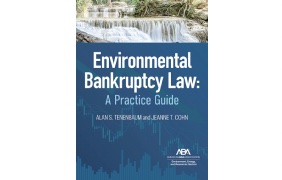ABA Press Release
These two experienced practicing lawyers begin with an account of the Bankruptcy Code, its purposes, its legislative development, and an overview of the Code’s chapters. The “bankruptcy for dummies” first chapter of the book will take even the novice environmental law through the basics of the statute, from its initial goals through the requirement of a filing “in good faith” through the automatic stay provisions and orderly collection and then distribution of assets.
This book is designed for both the beginning and the advanced environmental attorney. As a forty-year environmental-law veteran, I opened to the table of contents and found a specific reference to potential recovery of civil penalties in the environmental context and the implications of such collection with the automatic stay provisions of the Bankruptcy Code. I was then able to prepare a summary for my co-counsel involved in a state court environmental hearing with a bankruptcy petition newly filed by one of the parties. That was done within an hour thanks to the excellent organization of this book and the many citations in it.
Some law books are academically oriented and contain studious legal commentary on expansive subjects such as civil procedure or torts. This book is distinctly different. Environmental Bankruptcy Law is designed to be a practical and immediate guide to those lawyers enmeshed in this area who have clients who want a “quick answer.” In this lawyer’s experience, the request for a quick answer is made by virtually all our private and public clients. For such clients and for one’s own knowledge you should get this book.




